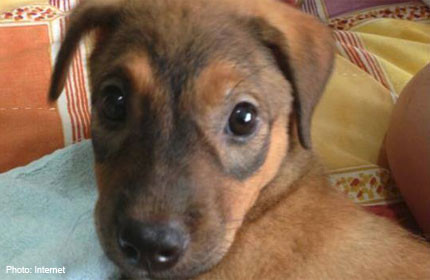Backlash after puppy put down

The dog trainer responsible for the training of seven-monthold puppy Tammy has insisted that there were no "aggressive overtures during the training period".
Mr Ricky Yeo, who is also the founder and president of Action For Singapore Dogs Society, an animal welfare organisation, added: "If the owner did not highlight any aggressive incidents... how could there be any 'unsuccessful attempts'?"
Mr Yeo, 45, was referring to the mongrel puppy that was put down on Oct 7 due to aggression.
Its adopter, Ms Alison McElwee, a clinic receptionist, had said the dog was aggressive and had bitten her and her two children.
The New Paper understands that Ms McElwee is currently overseas.
Tammy was put down at a veterinary clinic in Sunset Way, resulting in animal lovers and netizens calling for justice for the animal and both Ms McElwee and the vet from The Animal Clinic to be taken to task.
In a statement to the media on Monday, the managing director of The Animal Clinic, Dr Lennie Lee, said that from all the information made available to them by the owner, including the "unsuccessful correction of Tammy's aggression by a professional dog trainer", together with their own observation of the pup and confirmation that bites on the owner were consistent with animal bites, they concluded that "it would be in the interest of the dog and the family that the dog be put to sleep".
Dr Lee also said the clinic "acted professionally and followed all protocols" before coming to that decision.
But Mr Yeo, who had trained the dog for two months after it was taken to him for "normal" training and not because it was aggressive, said he was not consulted by the owner or the clinic before the euthanasia.
When asked if it did try to contact Mr Yeo, Dr Lee redirected the question to the clinic's lawyer. Attempts to contact the lawyer drew blanks.
Mr Yeo also wrote on his Facebook wall that in his many years of dealing with hundreds of dogs, he only "found two to three with serious mental deficiencies and were totally unpredictable and untrainable".
"These years of experience have taught me how to read the situation and their behaviour to know what safety protocols are needed, if any, and whether it is safe for the family," he said.
"In my interaction, not once did I detect any unpredictable, aggressive behaviour from Tammy."
Mr Yeo felt that although a vet may be in consultation with dogs all day, they are not experts in dog behaviour.
"They may infer behaviour on the surface, but the scope of their work does not lend them the environment nor the time and effort to study the behaviour of dogs in depth, unlike a professional dog trainer," he said.
He added that he had written to the Singapore Veterinary Association for clarification on the protocol to put an animal down.
Another dog trainer, Mr Patrick Wong, 51, told TNP that it is very hard to tell if a puppy is aggressive when it is only between three and eight months old.
BAD TEMPERAMENT
"Very seldom do you see pups nine months and below with aggression... At nine months, there are some dogs with bad temperament, but usually these can be corrected, especially when they are that young," he said.
Mr Wong, who trains dogs for movies and TV shows, said there are some that are aggressive because of their breed, but these are rare.
Tammy the mongrel puppy was rescued in April together with its four siblings and was the first among the litter to find a home.
Word about its death went viral online last week as dog activists, including those from the Save Our Street Dogs (SOSD) group, shared her story.
Its spokesman clarified that neither Tammy nor her re-homer were affiliated to SOSD.
"The post that we shared on our Facebook wall... was actually lifted directly from Tammy's re-homer and we pasted it as a post, with our condolences in the introduction... SOSD has no part in this case, as it has nothing to do with us or our team," she said.
WHY A DOG COULD BECOME AGGRESSIVE
Defensive: When the dog does something wrong and has retreated but the owner continues to pursue the matter. The only reason the dog can think of to explain this is that the owner intends to do it harm, so it protects itself. The best thing to do is to leave the dog alone.
Territorial: While this allows a dog to protect the home, the aggression can get out of hand. Here, good dominance relationship with the dog is crucial. The owner has to establish himself as the pack leader for the dog to feel secure.
Pain: A sick, injured or aged dog is vulnerable and would lash out in defence.
In heat: If there's a female in heat, unneutered male dogs will try to reach it and this drive can trigger uncharacteristic aggression towards family members. The solution: spaying.
juditht@sph.com.sg

Get The New Paper for more stories.